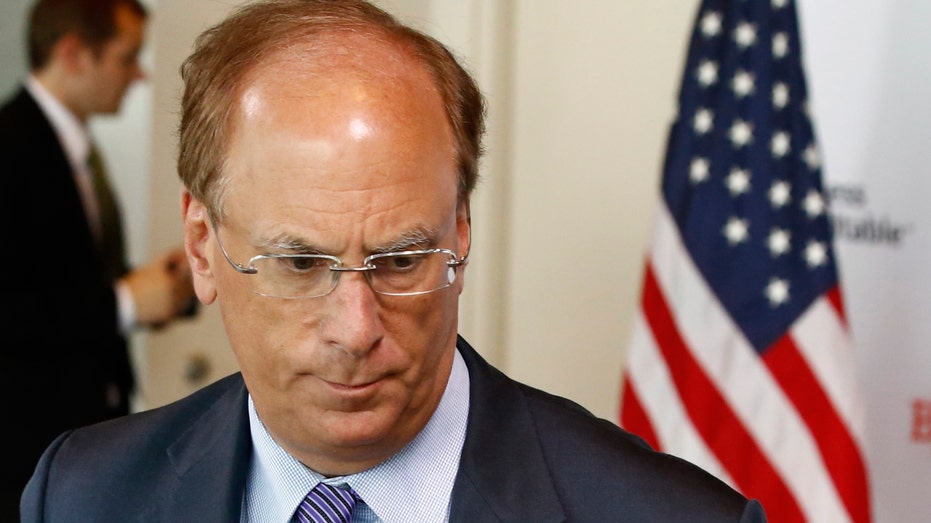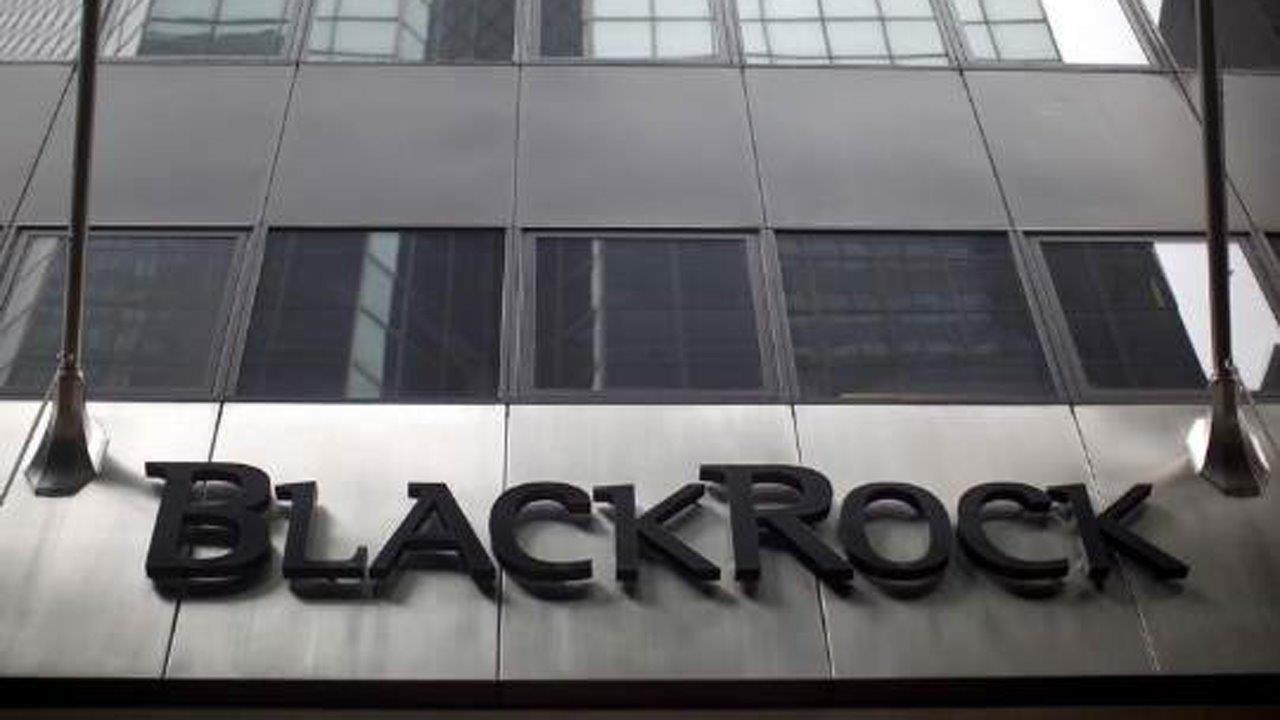BlackRock’s Larry Fink rattles employees amid political posturing
Laurence “Larry” Fink, the founder and chief executive of BlackRock, recently told the firm’s 14,000 employees that he is instituting potentially the most aggressive diversity program in Corporate America ensuring that, “a bunch of white men”, will no longer be running the world’s largest money management firm.
BlackRock, he said is now "putting the pieces in place so that five years from now we’ll have a more diverse (company) not just a bunch of white men."
The comments, obtained by FOX Business and confirmed by a BlackRock spokeswoman, come as Fink has ruffled feathers inside his company, as well as among some clients for embracing a number of progressive political causes and advocating what has been described as “corporate socialism” – a management concept that implores CEOs to run their companies in a way that doesn’t just benefit shareholders, but also “the communities in which they operate.”
In his comments on diversity, Fink used surprisingly strident language and said executives could see their paychecks cut if they didn’t meet certain hiring goals, according to a text of his remarks. Some BlackRock executives told FOX Business they believe that Fink is now instituting hiring quotas at BlackRock.
Fink, of course, isn’t the only CEO who supports progressive politics. Famed investor Warren Buffett was a staunch supporter of President Obama, and has spoken about the need for the rich to pay more in taxes to close the budget deficit.
But even corporate titans like Buffett attempt to avoid overt political discussions because they don’t want to upset shareholders and clients who might disagree with them. Legally, their primary responsibility is to enhance shareholder value, not to make the world a better place.
As a result, the tone of Fink’s recent pronouncements on issues such as the environment, diversity and corporate responsibility has now sparked a debate inside C-suites and among corporate governance experts. At issue is the propriety of a public company executive using business resources and his perch as CEO to advance a personal agenda.
“This is fundamentally not the role of a public company and it's unfair to investors who may not agree with his politics,” said Charles Elson, a corporate governance expert at the University of Delaware. "A CEO shouldn’t use house money to further a goal that may not create economic returns.”
Finks remarks to his employees on diversity have yet to be reported and they came on the heels of his annual “Letter to CEOs,” a yearly missive where he has increasingly pushed his fellow corporate titans to embrace progressive causes and manage with a “social purpose.”
In this year’s letter, released last Thursday, Fink stated that, “society is increasingly looking to companies, both public and private, to address pressing social and economic issues. These issues range from protecting the environment to retirement to gender and racial inequality, among others.”
“Society is increasingly looking to companies, both public and private, to address pressing social and economic issues. These issues range from protecting the environment to retirement to gender and racial inequality, among others.”
In private remarks to all of BlackRock’s employees a day earlier, Fink underscored the firm’s diversity efforts. To be sure, Corporate America and Wall Street in particular, have begun various programs and incentives for management to attract and retain more women and minorities to their executive ranks. Meeting diversity goals is among several factors that corporate managers are graded on.
But Fink appeared to go further at least in his remarks. He warned managers that their bonuses and pay will decline if they fail to meet diversity hiring targets, while using language to describe the new diversity effort that some BlackRock executives considered offensive. "My leadership team is being measured and their pay is being reflected on how they are driving diversity in their business” he said according to the text of his remarks. BlackRock, he said is now "putting the pieces in place so that five years from now we’ll have a more diverse (company) not just a bunch of white men."
“This isn’t about diversity,” said one BlackRock executive who spoke on the condition of anonymity about Fink’s remarks. “It’s about identity politics and virtue signaling that a CEO of a public company shouldn’t be engaged in.”
Heightening the tension over Fink’s comments is BlackRock’s recently shaky financial condition. The company just reported fourth-quarter 2018 earnings that missed analyst expectations. BlackRock remains both profitable and the world’s largest investor with about $6 trillion under management, but assets have been falling as investors yank their money from funds amid volatility in the equity markets that accelerated in the fourth quarter of last year. The firm’s share price, meanwhile, has declined more than 29 percent over the past year, and the company recently announced layoffs.
| Ticker | Security | Last | Change | Change % |
|---|---|---|---|---|
| BLK | BLACKROCK INC. | 1,079.90 | +23.52 | +2.23% |
Fink declined FOX Business’ request for an interview. BlackRock spokeswoman Melissa Garville would not address concerns that Fink has over stepped his role as CEO in embracing a political agenda, though she defended the company’s diversity efforts.
“BlackRock is committed to cultivating and advancing diversity in all forms because we believe a wide range of perspectives and talent is crucial to creating a richer culture for our employees and a greater experience for our diversified global client base,” she said in a statement.
From Bond Trader to Wall St.'s Soapbox Orator
Fink, 66, has had a long and distinguished career on Wall Street, well before he became Wall Street’s most prominent soapbox orator. He started BlackRock virtually from scratch in 1988, after a controversial career as a mortgage bond trader at First Boston, where he earned the reputation for taking risks so large that a massive trading loss forced him from the firm.
Fink clearly learned from his mistakes, setting up controls that built BlackRock into an investing behemoth. With BlackRock’s success, Fink has emerged as one of Wall Street’s most voluble figures, and someone who supported, albeit privately, left-of-center politicians. He was among the first corporate executives to back Barack Obama over Wall Street darling Hillary Clinton during the 2008 Democratic primary, and his campaign contributions have largely favored Democrats over Republicans.
Yet for most of his career, Fink’s public commentary focused largely on market trends and occasionally amorphous corporate-governance topics, such as CEOs relying on short-term results rather than long-term investments, something he called “short-termism.” JPMorgan CEO Jamie Dimon and Buffett also share this view.
It is more recently that Fink's commentary – in public speeches, employee meetings and his annual “Letter to CEOs” – has taken a distinctly political turn.
People who know him say the transformation may be an indication that Fink is looking at a political career when he is ready to retire from BlackRock. Fink had privately lamented he was not tapped as Treasury Secretary during the Obama years given his early support of the president, they add.

BlackRock CEO Larry Fink
CLIENT REVOLT
While Fink is said to be enjoying the spotlight, fashioning himself as the liberal conscience of Corporate America, competitors and many people inside BlackRock are less comfortable with his political commentary. “Larry is such a blowhard,” said one senior executive who knows Fink and works at a rival bank. “He’s just looking for publicity. We all embrace diversity, this guy just loves to hear himself talk about it.”
But Fink’s words have had consequences and people inside BlackRock complain that the firm has lost some big clients because of Fink’s political posturing. Case in point: BlackRock last year issued a statement that it “has reached out to the major publicly traded civilian firearms manufacturers and retailers to engage in a discussion of their business practices,” a response to the 2018 Stoneman Douglas High School shooting in which a gunman killed 17 people.
Fink won praise from the media for taking a stand against gun violence, but some BlackRock clients took offense to what they believed was a CEO using his bully pulpit to curtail their second-amendment rights and pulled their money from the firm, according to a person with knowledge of the matter.
A spokeswoman for BlackRock declined to comment but would not deny the client backlash.
NOT BACKING DOWN
Still, Fink shows no signs of giving up his progressive agenda because according to people who know him, he simply likes the attention. During his speech to employees last week, Fink remarked that “in this world of anti-globalism…I’m still a globalist and I’m proud of it.” He added that BlackRock managers have to “prove that every country whether its Mexico or Italy or Japan or China or Australia or the U.S. that we are instituting our purpose in every place we operate.”
“So the pressure is on, not just to make sure we have diversity…but making sure everywhere we operate that we’re showing our purpose, that we’re thriving in connection with society,” he added.
Fink then turned specifically to the company’s aggressive diversity efforts. He told employees that in 2019, BlackRock has achieved the highest percentage of women in the senior executive ranks, also known as managing directors. Women now comprise 56 percent of BlackRock’s new analyst class, and BlackRock has appointed five women to its board of directors. “I took the board of directors at BlackRock from zero women to five,” he added.
“Does that mean he fired male directors because they were men or because they weren’t good at their jobs?” a BlackRock executive told FOX Business.
The BlackRock spokeswoman declined to comment on the nature of the board changes.




















